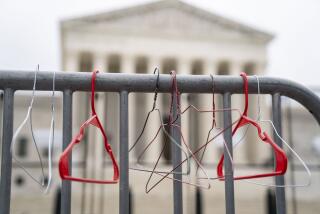Ending the judge wars
If President Obama wants to deliver on the bipartisanship he has promised, he might focus on a process that in recent years has produced the political equivalent of the Hatfield-McCoy feud. We’re talking about the selection of federal judges, which at least since the Clinton administration has been ensnarled in partisan politics. Obama can’t cut through those knots by himself, but he can help to minimize the possibility that filling judicial vacancies -- which now number 60 -- will be held hostage to squabbling in the Senate.
Partisan deadlock has been too frequent a feature of judicial confirmations regardless of which party controlled the White House or the Senate. Repeatedly during the 1990s and the first few years of this decade, then-Chief Justice William H. Rehnquist reproached the Senate for delays in voting on judicial nominees. His plea was echoed by the American Bar Assn.
This was not special pleading. Prolonged vacancies inconvenience not only judges and lawyers but citizens who seek redress from the courts. Although cases dealing with hot-button issues such as abortion and the death penalty dominate the news, federal courts also handlea multitude of cases that are important primarily to the parties. Yet these litigants have a right to expect that the resolution of their grievances in trial or appellate courts won’t be slowed by petty partisanship in the Senate.
The bickering has been thoroughly bipartisan. Democrats are still seething about the way a Republican-controlled Senate blocked or delayed some of President Clinton’s judicial nominees. Republicans complain that, during the Bush administration, the Democrats -- bent on revenge -- opposed even mainstream Bush nominees. Both parties are correct.
In 2005, Senate Republican leaders responded to Democratic obstruction by threatening to invoke the “nuclear option” of abolishing filibusters of judicial nominations. That radical departure from tradition was averted when, prodded by a bipartisan “Gang of 14,” the parties struck a deal under which some of President Bush’s choices were approved. As it happened, that group included highly ideological nominees who had drawn appropriate objections from Democrats, so the bipartisan compromise cleared the way for the appointment of several judges with extreme views.
Obama should remind Senate Democrats that excessive partisanship can backfire. Without giving up his constitutional right to shape the judiciary -- especially the Supreme Court -- the president also can put greater emphasis on professional qualifications in his appointments -- especially for district courts, the trenches of the federal judicial system.
Obama should do three things:
* First, he should reverse the Bush policy and invite the American Bar Assn. to help the administration screen potential judges, particularly candidates for appellate courts, including the Supreme Court. Bush severed the connection with the ABA because of fallacious complaints by Republicans that the group was biased against conservatives. Ironically, the ABA rated Bush’s two Supreme Court nominees, John G. Roberts Jr. and Samuel A. Alito Jr., as “well qualified.” A president is free to disregard the ABA’s advice. But affording an advisory role to the association provides political cover for the White House if home-state senators press for the appointment of politically connected but unqualified candidates.
* Second, Obama should lobby senators to establish local screening panels to interview would-be judges from their states and make recommendations. A role for home-state senators in the nomination of judges -- and U.S. attorneys -- is a long tradition, and not altogether a bad one. Senators are often more familiar with outstanding lawyers in their states than either the White House or the Justice Department. But familiarity also can breed contempt for the importance of qualifications.
That’s why senators should follow the example of California’s Dianne Feinstein and Barbara Boxer and impanel committees to recommend potential judges. Such panels will not banish politics from judicial selection. That was evident during the Bush administration when Boxer opposed a federal District Court nomination for Superior Court Judge and former U.S. Rep. James E. Rogan of Orange County -- even though Rogan had been recommended by the screening panel. For Boxer, Rogan’s role as a manager in the impeachment of Clinton trumped his credentials. Even so, screening panels establish a floor for judicial nominees and eliminate the ill-prepared or ethically challenged.
* Finally, Obama should follow the advice of Sen. Arlen Specter (R-Pa.) and renominate three Bush nominees whose appointments have languished in the Senate but who have been highly rated by the ABA and received bipartisan support. Specter notes that there is a precedent: Bush renominated -- and the Senate confirmed -- one of Clinton’s unsuccessful nominees to a federal appeals court.
One of the three candidates mentioned by Specter, former Assistant Atty. Gen. Peter Keisler, would take the seat formerly occupied by Roberts on the U.S. Court of Appeals for the District of Columbia Circuit. Keisler was praised by the Justice Department’s inspector general for opposing the Bush administration’s politicization of hiring in the department. Renominating Keisler could signal the beginning of a long overdue truce in the judge wars.
Together, these moves would recalibrate the politics of judicial nominations, reinvesting the process with professionalism and subordinating partisan differences to the important goal of an improved federal judiciary. Moreover, they might end the long delays that have discouraged nominees and dissuaded some capable candidates from pursuing federal judgeships.
For Obama, who campaigned on a promise to transcend party divisions, they have the added advantage of offering proof of his political rhetoric. Democrats and Republicans should join the administration in finding ways past the feuding that has too long prevented the appointment of the most qualified nominees to these positions.
More to Read
A cure for the common opinion
Get thought-provoking perspectives with our weekly newsletter.
You may occasionally receive promotional content from the Los Angeles Times.






